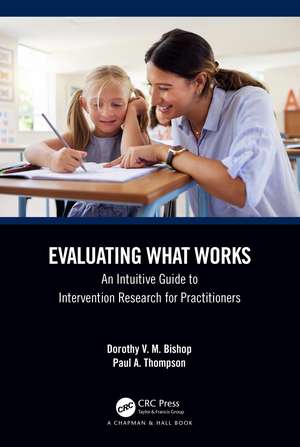Evaluating What Works: An Intuitive Guide to Intervention Research for Practitioners
Autor Dorothy V. M. Bishop, Paul Thompsonen Limba Engleză Paperback – 7 dec 2023
Key Features:
- Strong focus on quantitative research methods
- Complements more technical introductions to statistics
- Provides a good explanation of how quantitative studies are designed, and what biases and pitfalls they can involve
| Toate formatele și edițiile | Preț | Express |
|---|---|---|
| Paperback (1) | 370.47 lei 3-5 săpt. | +18.18 lei 4-10 zile |
| CRC Press – 7 dec 2023 | 370.47 lei 3-5 săpt. | +18.18 lei 4-10 zile |
| Hardback (1) | 893.27 lei 6-8 săpt. | |
| CRC Press – 7 dec 2023 | 893.27 lei 6-8 săpt. |
Preț: 370.47 lei
Nou
Puncte Express: 556
Preț estimativ în valută:
70.89€ • 74.20$ • 59.00£
70.89€ • 74.20$ • 59.00£
Carte disponibilă
Livrare economică 10-24 martie
Livrare express 21-27 februarie pentru 28.17 lei
Preluare comenzi: 021 569.72.76
Specificații
ISBN-13: 9781032590615
ISBN-10: 1032590610
Pagini: 234
Ilustrații: 6 Tables, black and white; 51 Line drawings, color; 51 Illustrations, black and white
Dimensiuni: 156 x 234 x 17 mm
Greutate: 0.34 kg
Ediția:1
Editura: CRC Press
Colecția Chapman and Hall/CRC
ISBN-10: 1032590610
Pagini: 234
Ilustrații: 6 Tables, black and white; 51 Line drawings, color; 51 Illustrations, black and white
Dimensiuni: 156 x 234 x 17 mm
Greutate: 0.34 kg
Ediția:1
Editura: CRC Press
Colecția Chapman and Hall/CRC
Public țintă
AcademicNotă biografică
Dorothy Bishop was Professor of Developmental Neuropsychology at the University of Oxford from 1998 to 2022. Dorothy is a Fellow of the Academy of Medical Sciences, a Fellow of the British Academy, and a Fellow of the Royal Society. She been recognised with Honorary Fellowships from the Royal College of Speech and Language Therapists, the British Psychological Society, and the Royal College of Pediatrics and Child Health. She has Honorary Doctorates from the Universities of Newcastle upon Tyne, UK, Western Australia, Lund, Sweden, École Normale Supérieure, Paris, and Liège, Belgium. She is an Honorary Fellow of St John’s College, Oxford.
Paul Thompson is an Assistant Professor in Applied Statistics and the department lead for statistics and quantitative methods at the Centre for Educational Development, Appraisal and Research (CEDAR) at the University of Warwick. Between 2014 and 2021 he worked at Oxford University within the Department of Experimental Psychology, working on a wide range of projects including behavioural, genetics, and neuroimaging (brain scanning) studies in developmental language disorders such as Dyslexia, and Developmental Language Disorder, and language development in those with learning and developmental disabilities, such as Down Syndrome and Autism.
Paul Thompson is an Assistant Professor in Applied Statistics and the department lead for statistics and quantitative methods at the Centre for Educational Development, Appraisal and Research (CEDAR) at the University of Warwick. Between 2014 and 2021 he worked at Oxford University within the Department of Experimental Psychology, working on a wide range of projects including behavioural, genetics, and neuroimaging (brain scanning) studies in developmental language disorders such as Dyslexia, and Developmental Language Disorder, and language development in those with learning and developmental disabilities, such as Down Syndrome and Autism.
Cuprins
1. Introduction 2. Why observational studies can be misleading 3. How to select an outcome measure 4. Improvement due to nonspecific effects of intervention 5. Limitations of the pre-post design: biases related to systematic change 6. Estimating unwanted effects with a control group 7. Controlling for selection bias: randomized assignment to intervention 8. The researcher as a source of bias 9. Further potential for bias: volunteers, dropouts, and missing data 10. The randomized controlled trial as a method for controlling biases 11. The importance of variation 12. Analysis of a two-group RCT 13. How big a sample do I need? Statistical power and type II errors 14. False positives, p-hacking and multiple comparisons 15. Drawbacks of the two-arm RCT 16. Moderators and mediators of intervention effects 17. Adaptive Designs 18. Cluster Randomized Controlled Trials 19. Cross-over designs 20. Single case designs 21. Can you trust the published literature? 22. Pre-registration and Registered Reports 23. Reviewing the literature before you start 24. Putting it all together 25. Comments on exercises 26. References
Descriere
Objective intervention research is vital to improve outcomes, but this is a complex area, where it is all too easy to misinterpret evidence. This book uses practical examples to increase awareness of the numerous sources of bias that can lead to mistaken conclusions when evaluating interventions.
